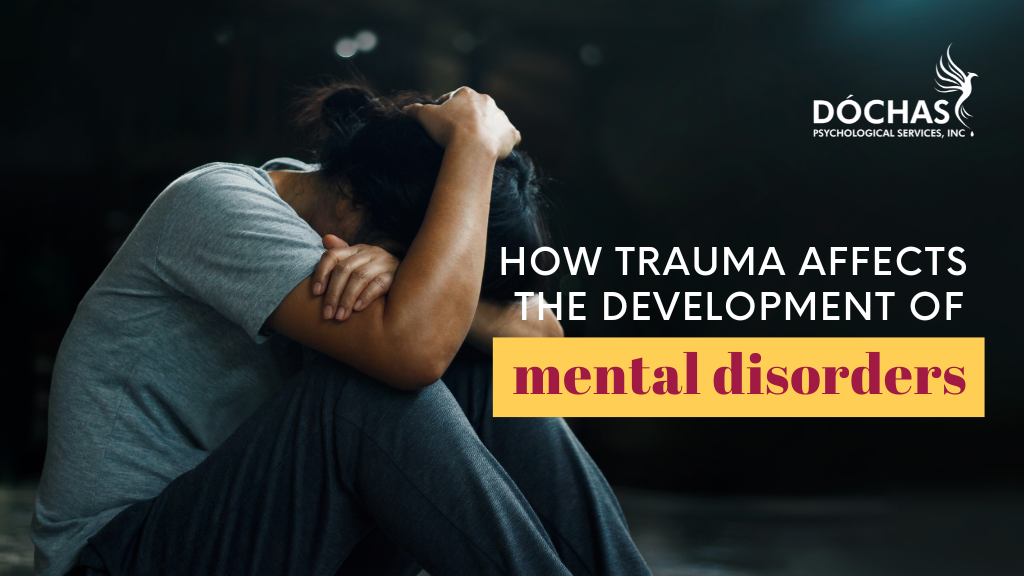“Emotional baggage”—we all have it. We’ve all had experiences in life which impact how we react to things in the future. But some experiences are traumatic, and the question comes up, “Can trauma lead to mental disorders?” It’s Kim on the Dóchas blog today, and I’m going to talk about how the role of trauma, specifically ongoing trauma, can actually affect the development of future clinical disorders.
You can watch the video below or read on to learn more!
What is Trauma
Let’s break down about what trauma is first. Here’s how I describe it. Trauma is when your system is overwhelmed to the point that you’re helpless in that situation. Your regular coping strategies don’t work. You’re overwhelmed, and because you’re overwhelmed you just don’t know what to do.
We have a blog that outlines some trauma responses here.
That experience can have significant impacts on how you view yourself, the world, and other people. It can have lasting impacts on your ability to emotionally regulate, and it can have lasting impacts on your physical self—for example, there’s some research to support a connection between trauma and autoimmune disorders. Overall, trauma has a significant impact. But how does this connect to our mental health? Well, a lot of that comes from how we cope with trauma, which I’ll dive into next.
How We Cope With Trauma
I defined trauma as when your system was overwhelmed and your regular coping strategies didn’t work. Because we are hardwired to survive, we come up with some pretty interesting ways to cope with that trauma. And not all of these ways are considered healthy!
For example, one way some people cope is to start to drink or use drugs. Self-harm can be a form of coping. Withdrawal from the world and relationships can be a form of coping.
Another coping strategy is dissociation. We all dissociate to a certain extent, because when our system is overwhelmed we can shut down. When we feel like we’re in a dream, that’s dissociation. So it can be a totally normal response, just like we all exhibit signs of narcissism without necessarily having narcissistic personality disorder, but dissociation can also become enough of a pattern in our lives to be connected to a lot of mental disorders.
Depending on how well-resourced you are at the time that the trauma occurs and how resilient you are at that time, the ways you learn to cope can affect the development of some clinical diagnoses later on. But we choose the strategy that we can use at the time to survive, so no judgment!

Possible Results of Childhood Trauma
So what are some ways trauma can affect clinical diagnoses later on? Let’s go back to childhood. Think about how vulnerable and helpless little ones are that are exposed to traumatic environments. They haven’t yet been exposed to challenging situations on a more minor scale where they can learn resiliency and they can learn, “Hey, I can overcome this, and I have the skills to do that.” They’re kind of pushed into the deep end of trauma.
In order for children to cope, they almost twist their thinking so that they don’t blame their caregiver. Because if they do, they’re losing what might be the only resource they have. This has long-term effects on how they view themselves, the world, their safety within it, their place in it, who they are, and all of those things. So patterns of coping can be helpful at the time, but in the long term they’re not actually that helpful.
Personality Disorders
Let’s start with personality disorders. Some studies have shown that, for example, personality disorders like narcissism and borderline personality disorder develop as a result of exposure to really traumatic things that happen as a child. These disorders could stem from some not-so-healthy coping strategies or survival strategies for that child. As a child, those strategies may work for them, and that’s why they keep using them. But as an adult or as a teenager, it’s not so helpful. They just haven’t learned any other ways. So to protect themselves and their psyche, they keep getting stuck in this pattern.
Personality disorders are not my field of expertise, but they’re a good example of one way trauma can affect mental health. You can see how it can be a survival skill, even though we see it as being super destructive.
PTSD
PTSD is pretty clearly a response to trauma, and you can see how some behaviours are actually a way to cope. One aspect of PTSD is hypervigilance—a person with PTSD is always checking, everything is a threat. They’re always on guard, and as a result, they end up really exhausted. Their view of the world is that it’s unsafe. Their view of themselves is that they can’t be trusted or that they couldn’t handle the world, and they beat themselves up for that. So there’s also a lot of shame. You can see how some behaviours of PTSD are a way to cope with past experiences.
Depression
Depression can also be linked to trauma. For example, a person might be thinking, “If I just beat myself up, then I will monitor my own behaviour so that I’m not ever under threat again. I just need to stay quiet and small.” It can be a way of coping with trauma.
ADHD
Some in the field that I’ve talked with also say that there’s a lot of overlap between trauma and ADHD. This link is a bit more uncertain because not everyone with ADHD has experienced trauma. But the link works like this—ADHD is not a problem of executive function, it’s a problem of having no filter on the stimuli coming in because everything’s coming in. Your system is constantly overwhelmed. So some of the behaviours that result from these overwhelming stimuli can mimic trauma. It’s that feeling of being overwhelmed.

How Does Trauma Affect the Development of Mental Disorders?
In the end, if I really simplify everything above, it comes down to this: trauma affects the development of other clinical, mental disorders because it can create some not-as-healthy ways of coping and surviving in our world. And those will show up in many different ways for many different people. We can look at how these coping strategies show up for people and how pervasive it is in their lives and how much it shuts them down and creates issues for them. If there is a pattern, that’s what can lead to the label of a mental health disorder.
What Do I Do If I’ve Experienced Trauma?
Trauma does not mean you’re going to develop a mental disorder! It depends on a lot of things, including how well-resourced you were at the time of the trauma. But my goal with this blog is to de-stigmatize some of these disorders, and see them as linked to ways of coping with traumatic experiences. And for some of you, you might look at some patterns in your life and start to think, “What am I using this to cope with?”
And if you have experienced trauma, remember, you’re not broken, you’re just trying to survive.
At the same time, you don’t get to be a jerk. Trauma is not an excuse to do whatever you want to other people.
Lastly, something that might help is to reframe your experiences and that might lead you to some strategies that maybe aren’t so destructive for you and actually help you a bit more. This is where sometimes a professional can help.
So in the meantime, please take care of yourself and we’ll see you later. Reach out to us if you’d like to discuss the role of trauma further—we’d love to give you a helping hand. You can reach us at 780-446-0300 or at info@dochaspsych.com.
About Dóchas Psychological
Dóchas Psychological Services is a well-established and trusted therapy clinic located in Spruce Grove, Alberta. At Dóchas we value the idea that everyone deserves a safe space. Through connection and education, our team works hard to build a trustworthy relationship with each of our clients. It is our goal to create a community for our clients to feel like they belong.
Disclaimer
Information provided through Dóchas Psychological Services blogs or vlogs is meant for educational purposes only. They are NOT medical or mental health advice. You can read more about our disclaimer here.









